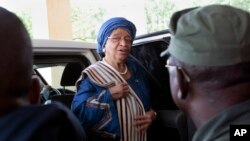Liberian President Ellen Johnson Sirleaf is ending the state of emergency she instituted because of the Ebola crisis.
In a speech Thursday, Sirleaf said the fight against Ebola is not over and that some restrictions will remain in place.
"Until the national goal of zero new cases by Christmas is achieved all across the country, we will keep many of the previous measures in place with appropriate adjustments consistent with the progress in our fight," she said.
The Liberian president said markets can reopen, and a curfew will be pushed back to midnight in non-affected areas. She said "hot spots" for the virus continue to appear in rural areas, but the worst may be over.
Sirleaf said 10 of Liberia's 15 counties have reported no new cases since Sunday.
Liberia had been under a state of emergency since August. Of the three African nations where the outbreak has been centered, along with Guinea and Sierra Leone, Liberia is the worst-hit by the epidemic.
News, however, was bleak from Sierra Leone. The World Health Organization says there has been a "steep increase" in the number of Ebola cases in Sierra Leone, with 421 new infections being reported this week.
One of Mali's leading Ebola clinics in the capital, Bamako, was forced to go on lockdown, following the death of a nurse. More than 90 people have been quarantined.
MSF launches clinical trials
Meanwhile, international health group Doctors Without Borders is launching clinical trials in West Africa to test the effectiveness of three potential Ebola treatments.
The group announced Thursday it hopes to begin the trials next month with the first results available as early as February.
Doctors Without Borders is partnering with three other organizations to conduct the separate trials, two of which involve antiviral drugs.
The French National Institute of Health and Medical Research will test a drug called favipiravir at an Ebola treatment center in Guinea. The University of Oxford will test the other drug, called brincidofovir, at a site that has not been chosen yet.
In the final trial, the Antwerp Institute of Tropical Medicine will test how well Ebola patients respond when given blood or plasma that contains antibodies from people who have survived the virus.
Doctors Without Borders says all of the patients in the trials will be informed about any potential risks and consent to the therapy.
It is also urging drug manufacturers to ramp up their supplies even before the trials end so that any treatments found to be effective can be applied without a delay.
The World Health Organization said Wednesday there have been 5,160 reported deaths in the outbreak and more than 14,000 total cases.





